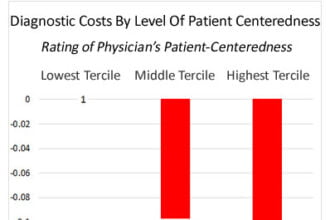This is the fourth post in a series on care coordination; this time focusing on other examples of team-based care. Patients with diabetes not only have to deal with the diabetes itself and its management, such as insulin and drugs, but they have to deal with nutrition, weight and exercise. They need to cope with potential side effects of the diabetes, such as damage to their eyes or kidneys or the blood vessels running into the lower legs that can lead to ulcerations, infections and even amputations.
This is the fourth post in a series on care coordination; this time focusing on other examples of team-based care. Patients with diabetes not only have to deal with the diabetes itself and its management, such as insulin and drugs, but they have to deal with nutrition, weight and exercise. They need to cope with potential side effects of the diabetes, such as damage to their eyes or kidneys or the blood vessels running into the lower legs that can lead to ulcerations, infections and even amputations. The current approach is for an internist to be the patient’s primary care physician and then to send the patient on to a specialist whenever a problem arises. A much better approach is the one developed by the Joslin Clinic in Boston, which has now been “franchised” across the country. The internist refers the patients to a Joslin Center for consultation. There the patient has a nurse as their coordinator and advocate, an endocrinologist to work out the specifics of their diabetic drugs and insulin, an exercise physiologist to help them with an exercise plan, a nutritionist to review their dietary needs, an on-site ophthalmologist expert in diabetic complications of the eye, and a podiatrist to deal with foot issues. The point is that all of these professionals are available in a single location. The patient comes to one place and one place only and from there can go to individual adjacent offices to see whomever they need to see. Whenever they come back to see, say, the exercise physiologist, if there is an issue or problem they immediately can be referred across the hall to the appropriate specialist. They key is that these healthcare providers are all working as a team and bring to bear all of the different disciplines necessary to the treatment of this complex and complicated disease for this individual patient. And by using an electronic medical record, the data is all present all of the time as the patient goes from one provider to another within the Center but also back home with his or her primary care physician. The result is better care, more coordinated care and a much more satisfied patient. It also costs much less because there is less duplication, less unnecessary testing or X-rays, and fewer hospitalizations because the patient is better cared for.
So as time goes on, more and more of these disease-based programs will emerge for the care of complex, chronic diseases. To some degree this may seem to threaten the primary care physician in the community. But it is really a benefit and an adjunct to both the physician and the patient. The primary care physician still sees the patient for the bulk of their individual care but knows that he or she and the patient have an expert team available to help either occasionally or more often as necessary.
Here is an example of team based care in orthopedics. Marshall Steele, III, MD is an orthopedic surgeon in Annapolis, Maryland who did a lot of knee and hip replacements. He was frustrated that the system just was not efficient nor was it patient or provider friendly or convenient. So he and some collaborators worked with their hospital, Anne Arundel Medical Center, leadership to devise a totally new approach to total joint replacement. Briefly, it works like this. A unit of the hospital was set aside solely for total joint replacement patients with its own dedicated staff. A single leader who had full responsibility but also the needed authority was placed in charge, eliminating the traditional silos that exist in most hospital management systems. Instead of being focused entirely on the inputs which dominates organizations structured in departments, this new model focuses first on the outputs (outcomes) of their work from the perspective of all stakeholders. All patients for the week are brought in the week before to meet each other, meet the staff, tour the facility and attend a class taught by a nurse navigator or coordinator of what will transpire during their stay. They are then all brought to the hospital for surgery the same day, necessitating that extra ORs be available for the orthopedists. After surgery the patients are put into a wellness environment outside of their hospital room. There they are brought together for some meals each day and for beginning physical therapy. They even return as outpatients for physical therapy together.
These steps plus many others have markedly improved physician, nurse and physical therapist coordination and satisfaction while working as a multi-disciplinary team, each with their own expertise unleashed for the care of these patients. The patients are much more satisfied and work together as a support group. At a formal luncheon one month later, patient and family input is sought and programs changed to respond to their needs and those of their families. Length of stay is down and complications have been reduced. Important hospital reported metrics are collected and shared with the team on easy to understand electronic dashboards. Patient reported metrics are collected on how effective the procedure was in reducing pain and return to desired activities. As word got around, more and more patients, many from great distances, sought out the team. Hospital revenues rose and the orthopedists became very busy. Other hospitals have tried to emulate this approach. But many fail. Why? Because, as Dr Steele points out, what is needed is a transformational change but most physicians, hospital staff and hospital managements are only able to muster incremental change. Incrementalism where transformation is needed just doesn’t work.
As medicine becomes more and more disease/patient-oriented, the traditional departments of medicine and surgery within a hospital will tend to be de-emphasized and in their place will come centers for cardiac care, cancer care, diabetes care, stroke care, joint replacement and the like. A multidisciplinary team approach to care will become much more common. Just as with the primary care physician, this shift will appear to many practicing specialists to be a “threat” to their autonomy and certainly to their long-held practice patterns. To be effective they must have an effective electronic medical record system. Moreover, insurers do not like to pay for a team to see a patient. Their approach is to pay one physician for one consult or one patient visit. To pay for three doctors to see one breast cancer patient all at once is anathema, and, in general, they may refuse payment. Hospital managers, like physicians, are “conservative” and traditional, with functions organized in a format that was effective many years ago but which is no longer. But change is difficult and as pointed out in the story above on joint replacement, the change needed is transformational, not incremental. The electronic medical record, critical to success of these arrangements, must be part of the transformational change. Change will not come easily; but it must occur and so it will, but not quickly. But the hospitals who figure this out first will have a competitive advantage.
These stories raise the question as to why it is so difficult for physicians and hospitals to change their ways when the new approach can be shown to be so much more effective in delivering improved quality of care at a reduced cost?
My new book, “The Future of Health-Care Delivery: Why It Must Change and How It Will Affect You,” from which this post is adapted, will be published February 28, 2012 by Potomac Books. You can find it now at Amazon at http://tinyurl.com/









